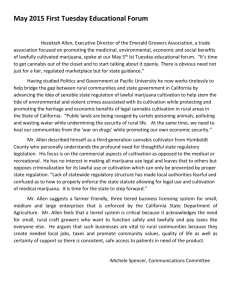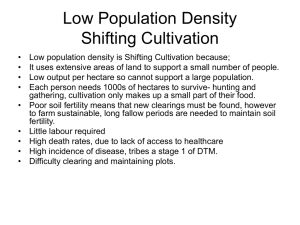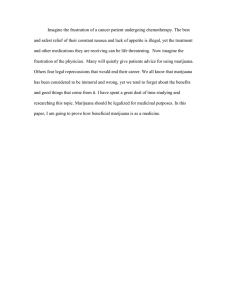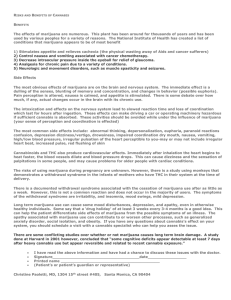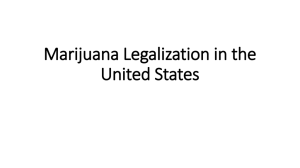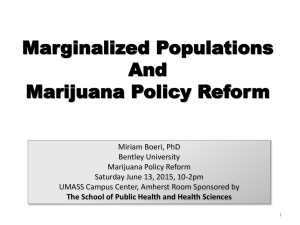Ban the Bans: Taking California Back
advertisement
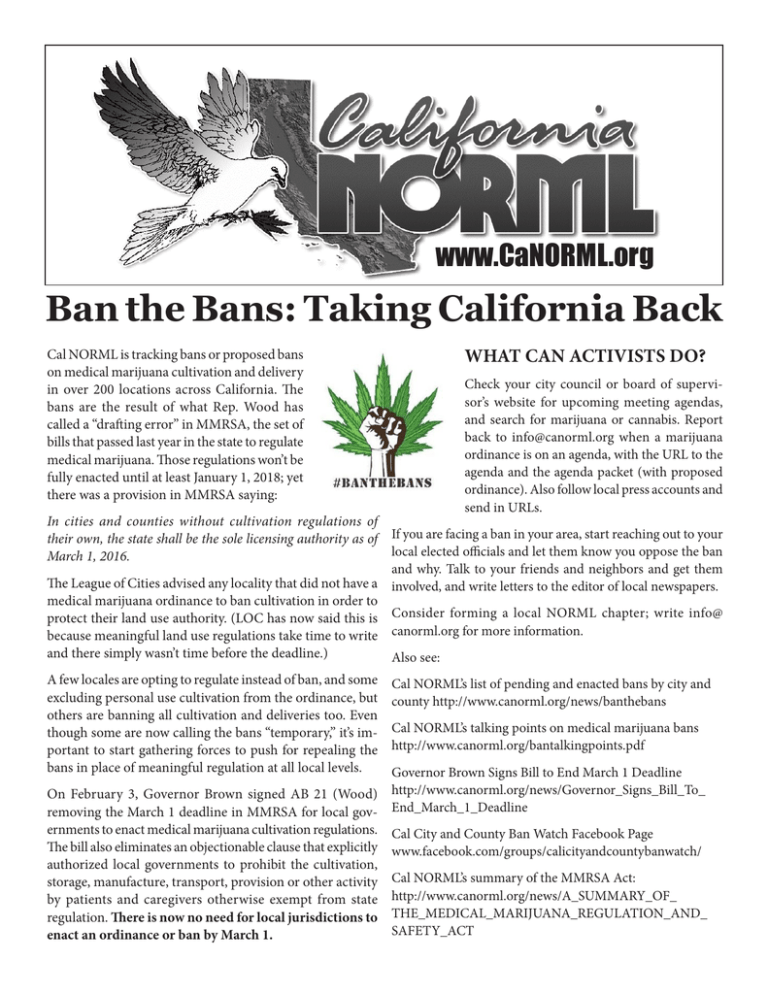
www.CaNORML.org Ban the Bans: Taking California Back Cal NORML is tracking bans or proposed bans on medical marijuana cultivation and delivery in over 200 locations across California. The bans are the result of what Rep. Wood has called a “drafting error” in MMRSA, the set of bills that passed last year in the state to regulate medical marijuana. Those regulations won’t be fully enacted until at least January 1, 2018; yet there was a provision in MMRSA saying: WHAT CAN ACTIVISTS DO? Check your city council or board of supervisor’s website for upcoming meeting agendas, and search for marijuana or cannabis. Report back to info@canorml.org when a marijuana ordinance is on an agenda, with the URL to the agenda and the agenda packet (with proposed ordinance). Also follow local press accounts and send in URLs. In cities and counties without cultivation regulations of their own, the state shall be the sole licensing authority as of If you are facing a ban in your area, start reaching out to your local elected officials and let them know you oppose the ban March 1, 2016. and why. Talk to your friends and neighbors and get them The League of Cities advised any locality that did not have a involved, and write letters to the editor of local newspapers. medical marijuana ordinance to ban cultivation in order to protect their land use authority. (LOC has now said this is Consider forming a local NORML chapter; write info@ because meaningful land use regulations take time to write canorml.org for more information. and there simply wasn’t time before the deadline.) Also see: A few locales are opting to regulate instead of ban, and some excluding personal use cultivation from the ordinance, but others are banning all cultivation and deliveries too. Even though some are now calling the bans “temporary,” it’s important to start gathering forces to push for repealing the bans in place of meaningful regulation at all local levels. Cal NORML’s list of pending and enacted bans by city and county http://www.canorml.org/news/banthebans Cal NORML’s talking points on medical marijuana bans http://www.canorml.org/bantalkingpoints.pdf Governor Brown Signs Bill to End March 1 Deadline On February 3, Governor Brown signed AB 21 (Wood) http://www.canorml.org/news/Governor_Signs_Bill_To_ removing the March 1 deadline in MMRSA for local gov- End_March_1_Deadline ernments to enact medical marijuana cultivation regulations. Cal City and County Ban Watch Facebook Page The bill also eliminates an objectionable clause that explicitly www.facebook.com/groups/calicityandcountybanwatch/ authorized local governments to prohibit the cultivation, storage, manufacture, transport, provision or other activity Cal NORML’s summary of the MMRSA Act: by patients and caregivers otherwise exempt from state http://www.canorml.org/news/A_SUMMARY_OF_ regulation. There is now no need for local jurisdictions to THE_MEDICAL_MARIJUANA_REGULATION_AND_ SAFETY_ACT enact an ordinance or ban by March 1. Talking Points on Pending Medical Marijuana Bans • On February 3, Governor Brown signed legislation, AB 21, to repeal the March 1 deadline for local action in state law MMRSA. THERE IS NOW NO NEED TO ACT TO PROTECT LOCAL AUTHORITY UNDER MMRSA. (See Rep. Wood’s letter to local officials http://www.canorml.org/woodsletter.pdf) exercising any right otherwise granted by State law, including Proposition 215 and Senate Bill 420. Rather, the intent and purpose of this Article is to establish reasonable regulations upon the manner in which marijuana for medicinal purposes may be commercially cultivated, including restrictions on the amount of marijuana that may be cultivated in any location or premises, in order to protect • If you feel you must act now, please consider these the public health, safety and environment in the county. options: - last, and most importantly, appoint an ad hoc commit- enact Cal NORML’s suggested language instead (see tee or other group to study the issue and come up with below) meaningful land regulations in (city or county) that will - make it a 45-day moratorium instead of a ban, as Solano protect both public safety and patient access, as well as County and Los Angeles have, until regulations can be allow for the enforcement of environmental regulations addressed and the taxation of commercial medical marijuana activities. (Tell them you are willing to serve on such a - (if this bans all cultivation) the ordinance should be committee, if you are, or recruit community members rewritten to ban commercial cultivation only; this is the who will serve.) only activity covered by MMRSA. There is no need to strip all patients in (your city or county) of their rights • It’s sadly ironic that now that the state has finally moved even if you feel you must pass a cultivation ban. Cities to regulate commercial-sized medical marijuana activiacross the state have banned commercial cultivation ties, something local jurisdictions have been calling for, but have made an exemption for personal-size gardens. many local governments are moving to ban what would Other places are developing licensing regulations instead be better regulated, taxed, and brought into the light of of bans. (Name places near you.) Language could be day. Please protect patient rights and work with us toadded saying: wards meaningful regulations instead that will protect public safety and the environment, and patients’ rights. This ordinance is not intended to prohibit persons from Cal NORML’s Model Ordinance Language to Retain Local Licencing Authority Prior to and as a continuing requisite to the commercial cultivation of medical cannabis in conformance with all state laws and regulations, the person(s) or legal representative of the person(s) wishing to engage in the commercial cultivation of medical cannabis shall first obtain a regulatory permit from the city manager or designee. “Commercial Cannabis Cultivation” does not include cultivation by: (1) A qualified patient who cultivates, possesses, stores, manufactures, or transports cannabis exclusively for his or her personal medical use but who does not provide, donate, sell, or distribute cannabis to any other person for profit; (2) A primary caregiver who cultivates, possesses, stores, manufactures, transports, donates, or provides cannabis exclusively for the personal medical purposes of no more than five specified qualified patients for whom he or she is the primary caregiver, but who does not receive remuneration for these activities except for compensation in full compliance with subdivision (c) of Section 11362.765 of the Health and Safety Code; or (3) qualified patients or caregivers who collectively or cooperatively associate to cultivate, possess, store, manufacture or transport medical cannabis but who do not provide, donate, sell, or distribute cannabis to any qualified patient or primary caregiver for profit in compliance with subdivision (a) of Section 11362.765 and subdivision (a) of 11362.775 of the Health and Safety Code.]transport medical cannabis but who do not provide, donate, sell, or distribute cannabis to any qualified patient or primary caregiver for profit in compliance with subdivision (a) of Section 11362.765 and subdivision (a) of 11362.775 of the Health and Safety Code.
